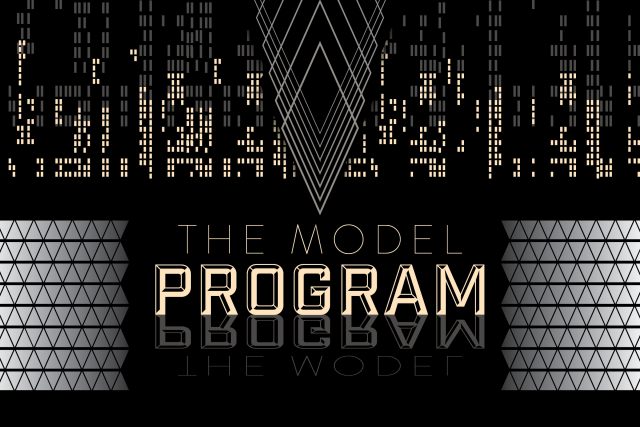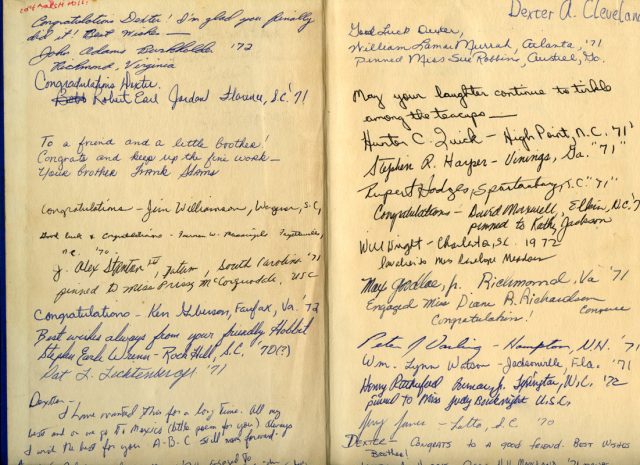By: Dylan McKenzie
Story originally published for the Star & Lamp of Pi Kappa Phi – Summer 2019

Swearing solemn oaths by candlelight. Committing each week to build an ideal chapter. Cycling across the nation to support people with disabilities. Having the difficult—but necessary—conversations with chapter brothers to uphold the fraternity’s expectations.
Brothers across the nation proudly uphold and continue these traditions. They share that these experiences were formative in their undergraduate experience and provided the foundation with which to build a successful career and fulfilling life.
But these traditions haven’t always existed.

The first initiation did not take place until nearly two years after that clandestine meeting at 90 Broad Street. J. Friend Day did not author The Student Creed until ten years after Founder Kroeg passed on to the Chapter Eternal. The Journey of Hope did not begin until 1987, when one man bravely set out on his bicycle. Ultimate Respect was not introduced to the fraternity until 1990, with the revision of The White Diamond by TJ Sullivan, Alpha Psi (Indiana).
So why have these traditions become so integral to the Pi Kappa Phi experience? What would our fraternity look like without them? Did their creators know how important they would become?
Regardless of those answers, we know one thing to be true: fraternities across the nation rely on traditions to teach their history and values to new members, forge lifelong friendships and effectively manage their chapters.
Since our humble founding in Charleston, South Carolina, Pi Kappa Phi has balanced upholding tradition and boldly innovating. We honor and respect the work and accomplishments of those who came before—those giants whose shoulders we stand upon—but we are not afraid to challenge the status quo, to venture out into the unknown and redefine this thing we call “fraternity.”
We know that fraternities don’t operate in a vacuum; as the world changes around us, we must change or be left behind.
And so, it is that we come to reflect on one long-standing tradition. Its beginning is not well-documented but is mentioned in the Star & Lamp as early as 1913. It’s a tradition that every member has participated in: associate member education.

While specific practices have varied from chapter to chapter, the purpose of associate member education has largely remained the same: to introduce and integrate new members into the chapter at large by teaching our history and values.
The way in which we approach associate member education has also remained constant, to some degree. We ask associate members to review The White Diamond to learn about the fraternity, we spend education sessions reviewing the content in The White Diamond and we administer quizzes and tests to measure the learning of associate members.
In response to events across the country, colleges, parents and potential new members question the value of fraternities. Colleges and universities continue to move toward four or six-week frameworks and/or requirements for new member education programs. The North American Interfraternity Conference (NIC) is working with campuses and member organizations to reduce the length of the new member experience and increase learning objectives.
And so, we are faced with a challenge: we must demonstrate, in no uncertain terms, the value of the associate member education process. If we fail to do this, we risk losing one of our longest-running traditions altogether.
How do we demonstrate the value of associate member education? Are there areas in which we can improve associate member education? How do we honor our traditions while making necessary changes? A successful, well-planned associate member education process will address these questions while instilling in each new member a sense of belonging and understanding.
It is with these questions in mind that the 56th Supreme Chapter convened in the late summer of 2018. There, the legislative body directed the National Council and national headquarters staff to “…select a number of chapters to participate in a six-week new member education pilot program to collect data on the logistics and feasibility of a six-week new member process…”
Coincidentally, the fall 2018 term saw a substantial increase in the frequency of hazing incidents as well as a decreasing tolerance for high-risk behaviors. As a result, the National Council announced that all chapters would be required to participate in this new member education pilot program beginning fall 2019.
The Model Associate Member Education Program will provide a shared member education and brotherhood experience for all of our members, increase a mutual sense of belonging to Pi Kappa Phi, promote the health and safety of our associate members and empower our newest members to practice leadership from their earliest moments of membership.
The Model Associate Member Education Program relies on experiential activities, discussions and personal reflections to not just teach about Pi Kappa Phi, but to foster a sense of belonging to the chapter and national organization and help associate members understand the obligations each Pi Kappa Phi assumes during the Ritual of Initiation. While there are some differences from processes facilitated in the past by chapters, the model program maintains many of our traditions.
Chapters will still have the opportunity to administer weekly quizzes to associate members, teach local and national history as well as the governance of Pi Kappa Phi, promote academic achievement by developing individual academic improvement plans for associate members, hold education sessions and facilitate subordinate rituals.
Additionally, chapters were given the opportunity to apply for modifications to the Model Associate Member Education Program, and nearly 90 modification requests were submitted. Chapters worked with the national headquarters throughout the spring to determine whether their requests would be authorized. Final statuses of modification requests were communicated to those chapters at the end of the spring term.

The Model Associate Member Education Program introduces a few major changes, including:
- A structured volunteering or awareness event for associate members
- Behind Happy Faces: Module One, a workshop developed by Ross Szabo, Theta Eta (American), that begins a conversation about mental health and mental illness
- The creation of an individual member development plan
- A one-day associate member retreat
- A capstone project to replace the written exam and oral boards
Additionally, the big brother pairing process has been revised to focus on mentorship and guidance. While the ceremony now occurs during the second week of associate member education, big brothers participate in an orientation session to better understand their responsibilities. Following the ceremony, both the big brother and little brother create and sign a contract to outline their expectations for one another. Finally, big brothers play an extended role in the associate member education process by participating in weekly reflection activities with their little brother.
In preparation for the full rollout of the Model Associate Member Education Program in the fall, the national headquarters is gathering feedback and providing resources and coaching to all chapters. Wardens at Pi Kapp College for Chapter Officers 2019 identified needs for resources around brotherhood building activities for associate members and initiated members as well as guidance regarding the capstone project, which challenges associate members to lead meaningful change in their chapter, campus or local community. These resources (and more) are being developed by the national headquarters to assist chapters with the transition to the model program.
The Council of Wardens, created at the direction of the 56th Supreme Chapter, represents different chapter sizes, geographic locations and statuses. Collectively, the group will gather feedback and advise the national headquarters on the materials and programming offered by the Model Associate Member Education Program.
Jairus Moore, an associate member at Epsilon Psi (Slippery Rock), participated in the model program this spring. When asked about his experience, he said “It was a huge eye-opener. I didn’t expect the associate member experience to be about mentorship and actually get me to think about myself and others. It made me really think about who I am and how to be a better person.”
The national headquarters will continue to provide resources, coaching and guidance to chapters throughout the spring and fall, and will continue to collect feedback so that the program can become an impactful new tradition for Pi Kappa Phi.
The role of associate member education is unique within the college experience, as it seeks not just to share history, but to serve as the genesis of a bond that will tie these future brothers of Pi Kappa Phi together, both within their chapter and the greater fraternity. The Model Associate Member Education Program is new, but its goal has existed since the founding of the fraternity. As we continue into the second century of our brotherhood, we will witness the continuation of old traditions and the birth of new ones. This desire to improve and willingness to embrace positive change is central to Pi Kappa Phi and will ensure the continued success of the greater fraternity.
Spring 2019 Participants:
Omicron (Alabama)
Tau (NC State)
Chi (Stetson)
Alpha Epsilon (Florida)
Alpha Eta (Samford)
Alpha Mu (Penn State)
Alpha Sigma (Tennessee)
Beta Epsilon (Missouri)
Beta Iota (Toledo)
Delta Sigma (Bowling Green)
Epsilon Alpha (Elon)
Epsilon Beta (Grand Valley State)
Epsilon Psi (Slippery Rock)
Eta Epsilon (Maryland)
Eta Chi (Texas Christian)
Zeta Beta (UC – San Diego)
Zeta Epsilon (George Mason)
Zeta Psi (IUPUI)
Theta Rho (Western Michigan)
Iota Phi (Loyola – New Orleans)
Iota Chi (Ball State)
Kappa Lambda (Wisconsin)
Kappa Upsilon (Temple)
Loyola – Chicago
Northeastern
The 2019 Council of Wardens
Matthew Davis
Alpha Epsilon (Florida)
Christian Rushing
Alpha Lambda (Mississippi)
Thomas Sottile
Alpha Mu (Penn State)
Jacob Johnson
Delta Eta (Morehead State)
Tyler Hanson
Delta Chi (Kansas State)
Robert Bailey
Epsilon Psi (Slippery Rock)
Trevor Bettis
Kappa Nu (Sonoma State)
Gavin Keogh
Kappa Lambda (Wisconsin)
Benjamin Nigrin
Northeastern Associate Chapter
Read the full issue of the Star & Lamp of Pi Kappa Phi – Summer 2019